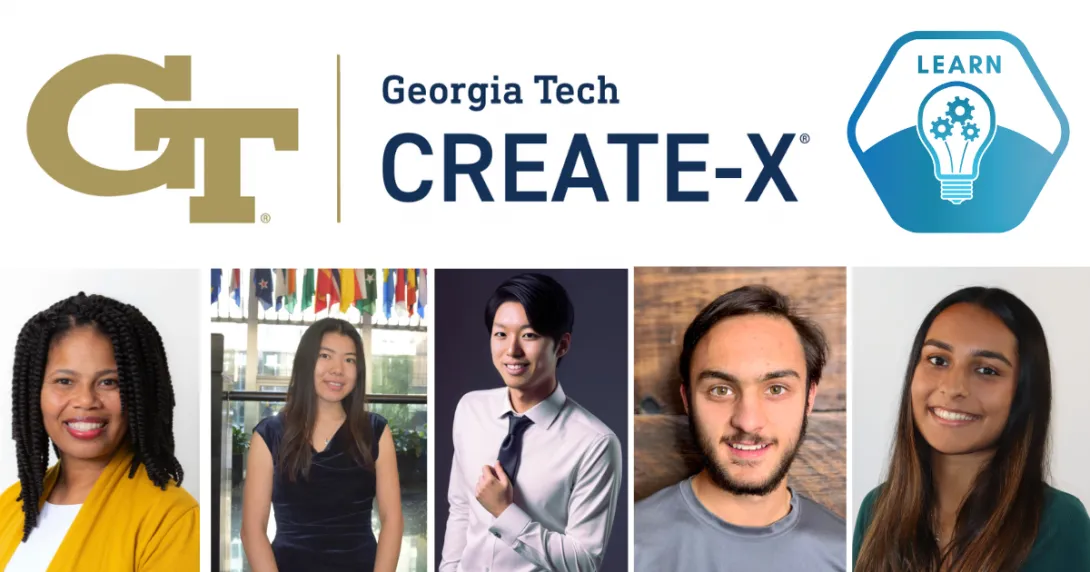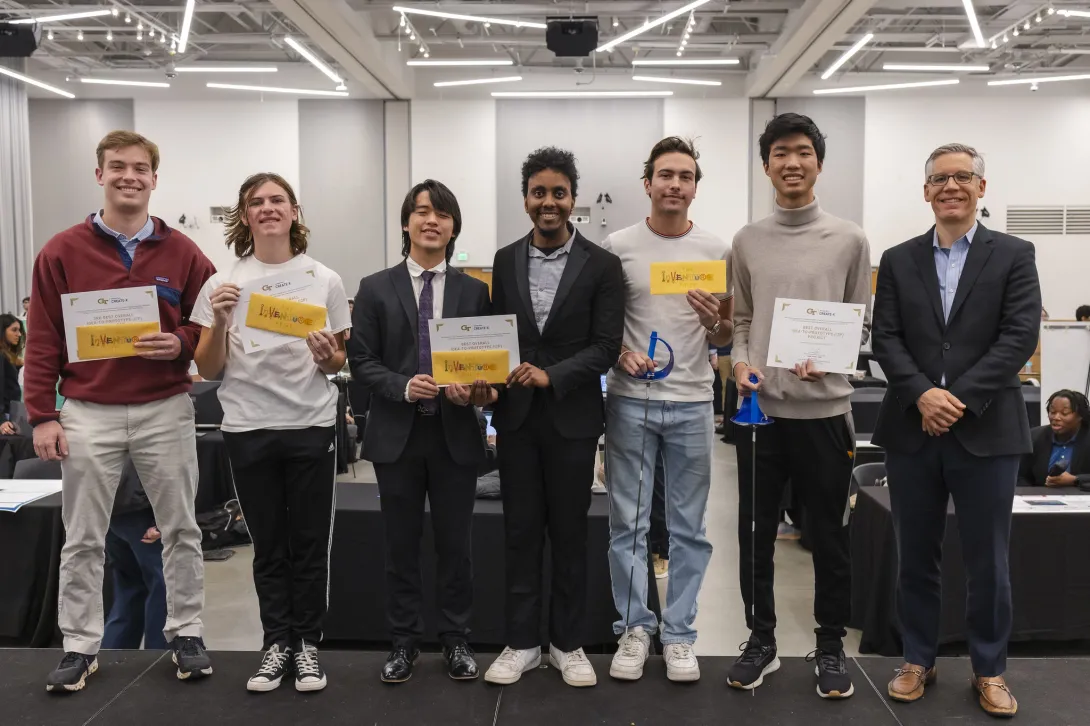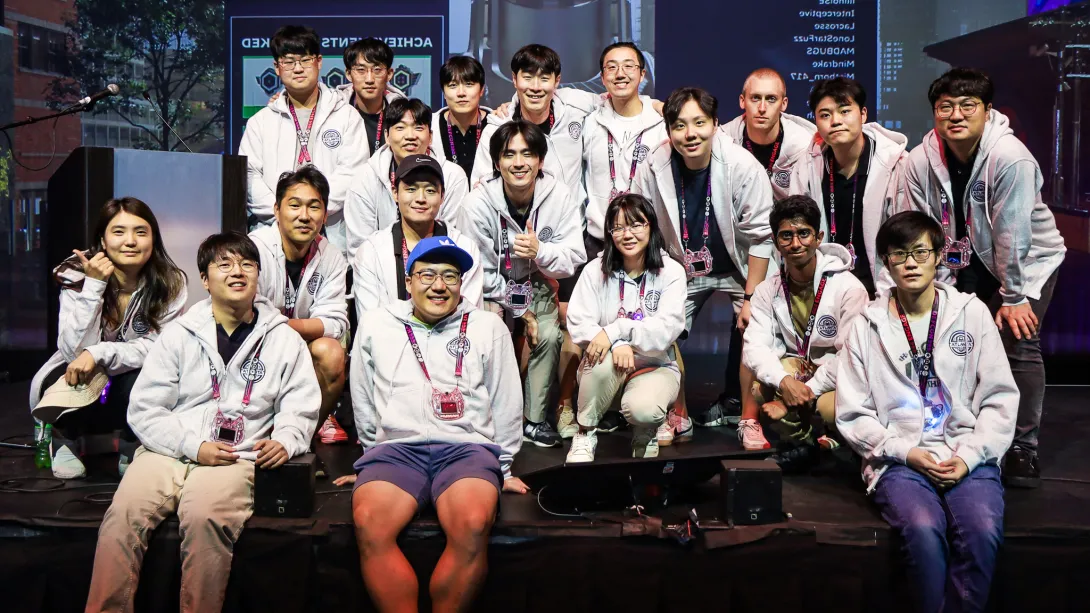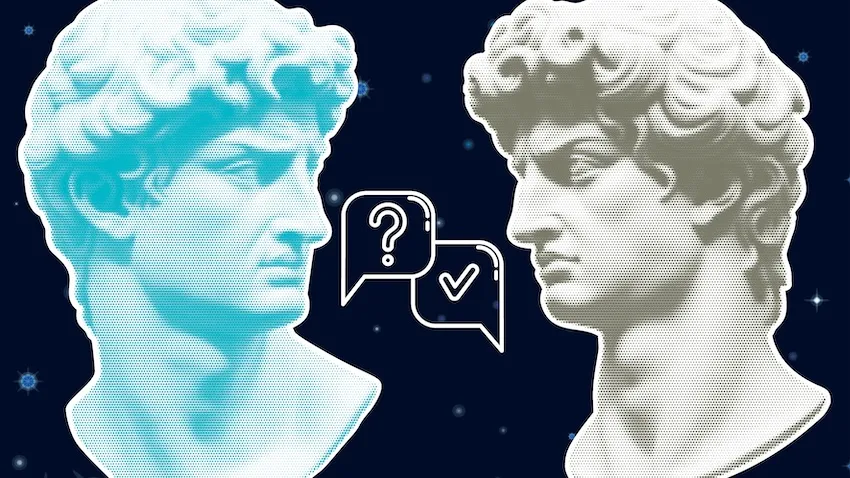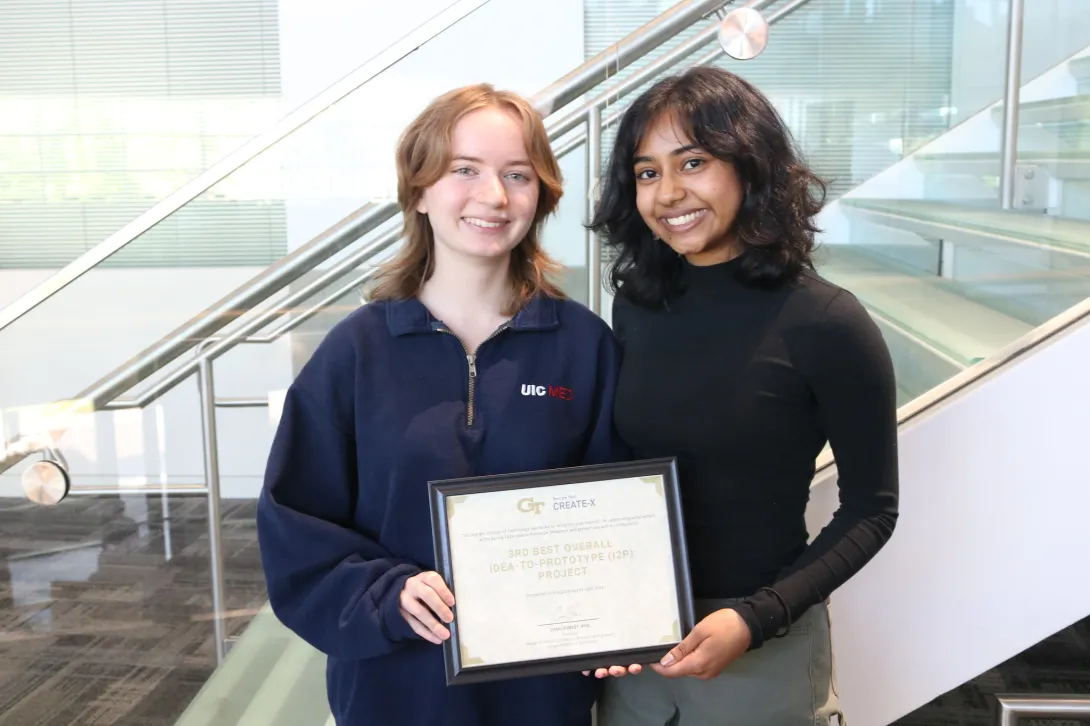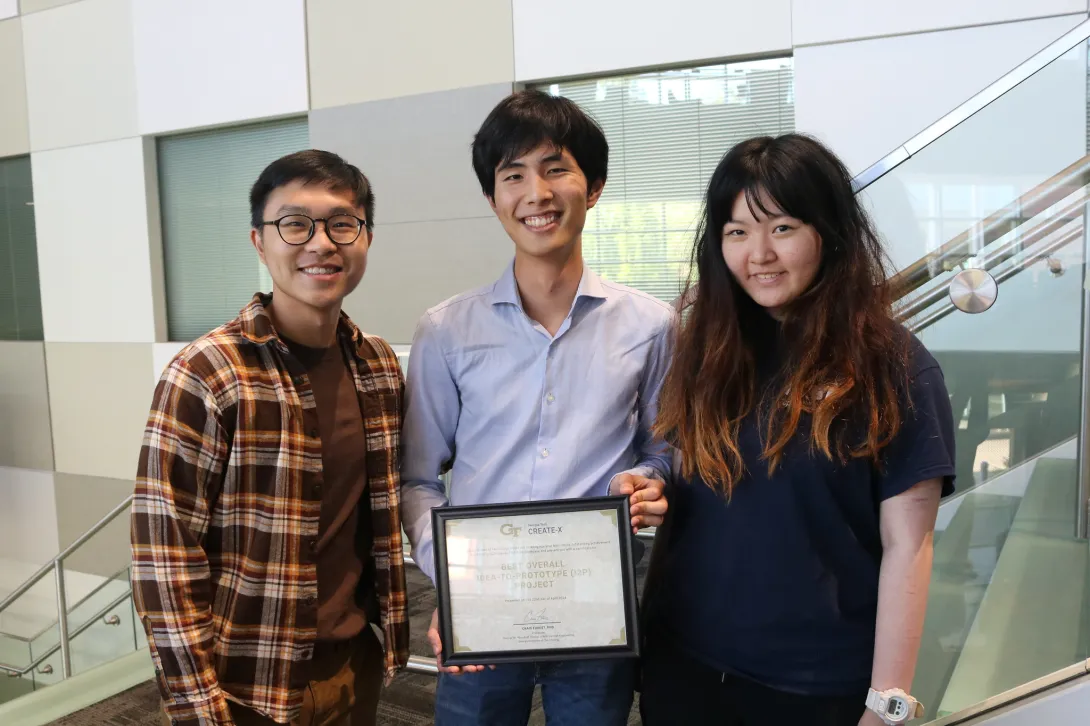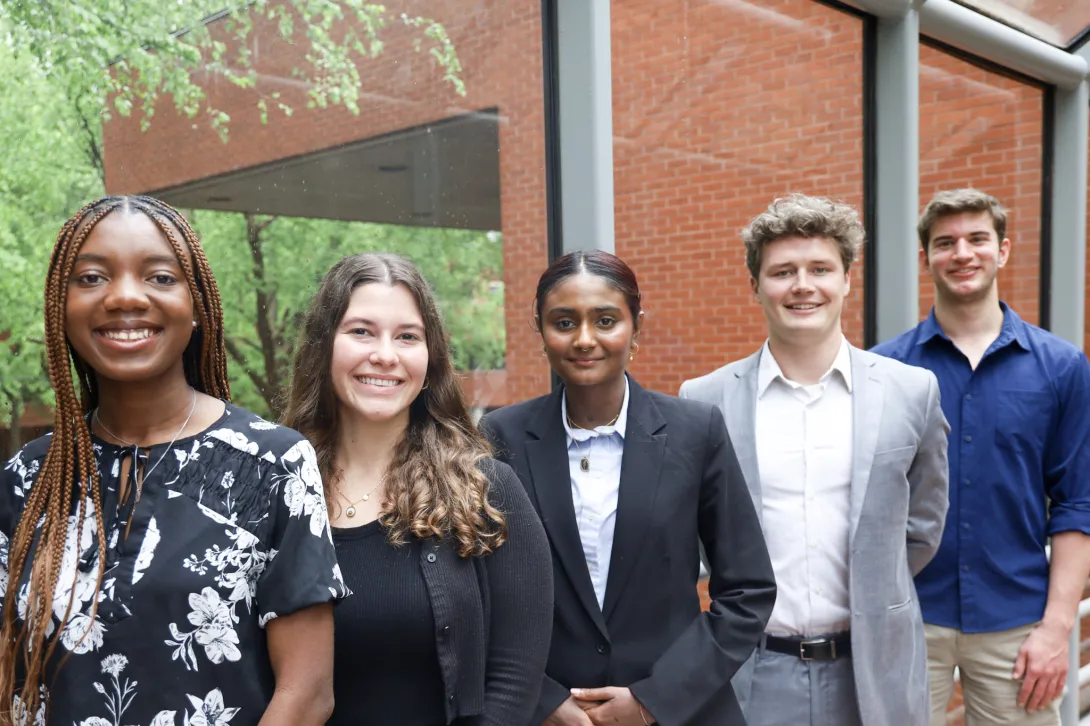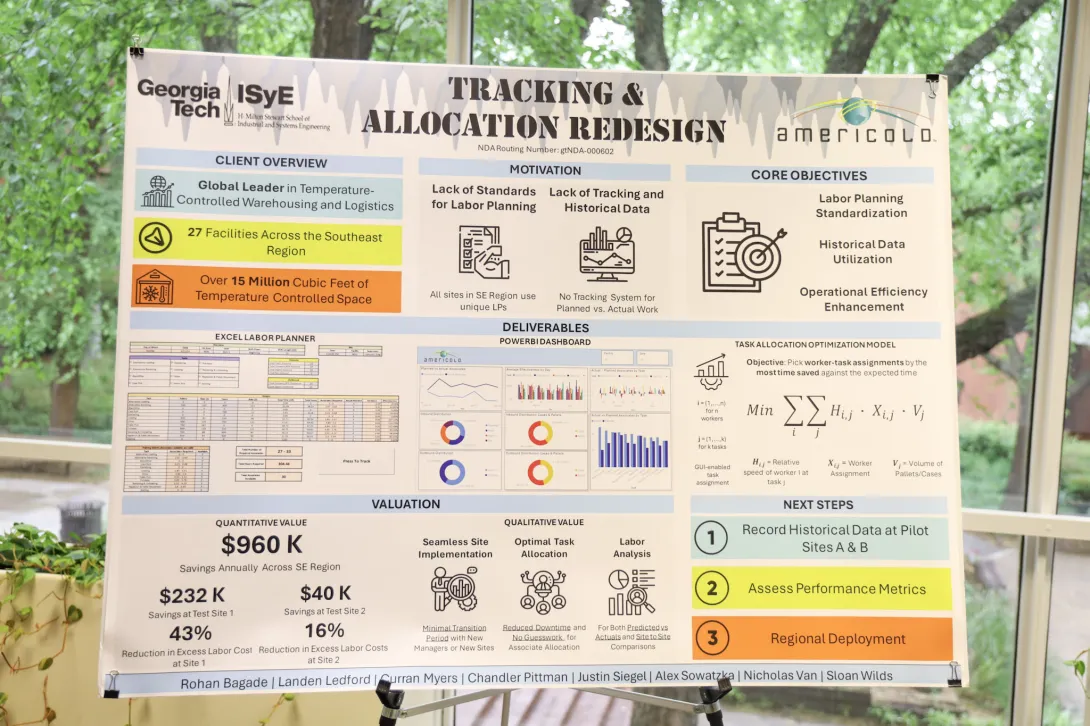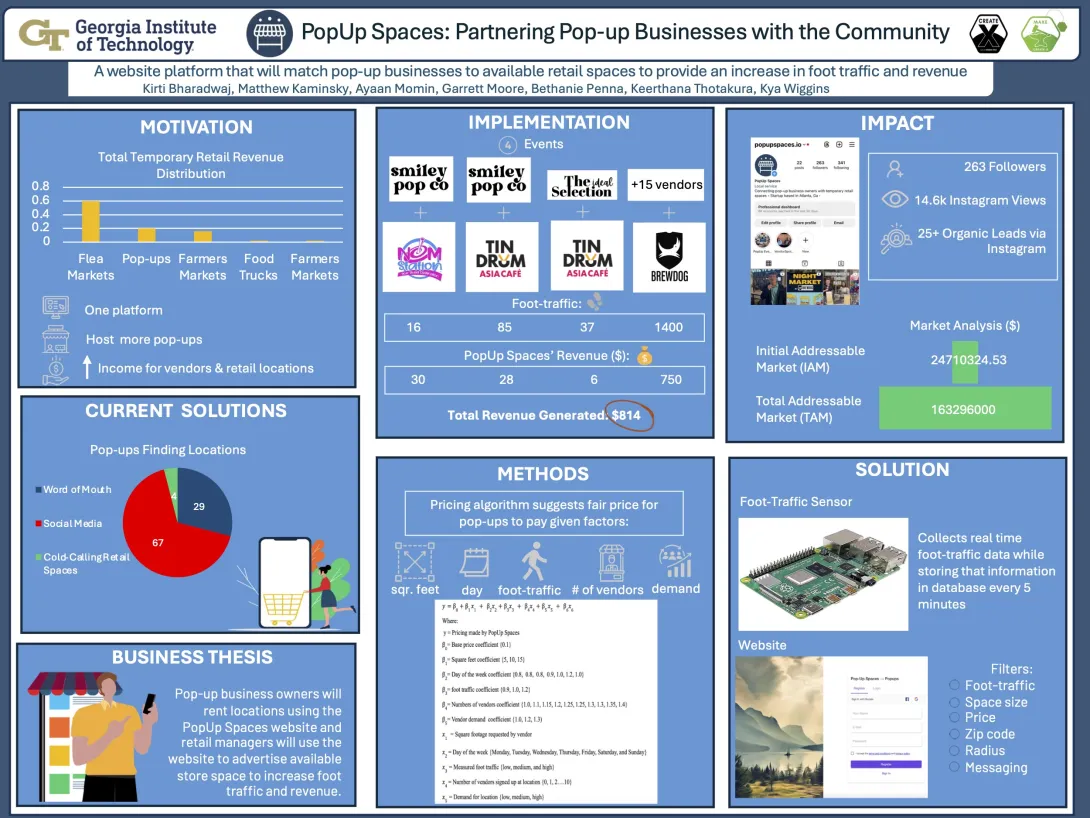Apr. 04, 2025
Four students from Startup Lab have been selected to join the 2025 immersive cohort at South by Southwest (SXSW) in Austin, Texas. Alex Aridgides (mechanical engineering and economics), Shinhai Chen (industrial engineering), Varuni Chopra (industrial engineering), and Christie Peng (computer science) are the first Georgia Tech students to be invited to the program.
The weeklong, all-expenses-paid program offers university-affiliated innovators the chance to refine their innovations, engage in customer discovery, and network with industry leaders and peers at SXSW. The annual festival celebrates technology, film, music, education, and culture. Students participated in a competitive application process, which involved submitting applications, meeting specific evaluation criteria, and being selected by a panel of industry experts, mentors, and SXSW organizers.
Yolanda Payne, the students’ Startup Lab instructor, presented the SXSW opportunity in class.
"My goal is to be their biggest cheerleader,” she explained. “I had great teachers who helped me get to where I am today, and I strive to emulate their support. I’m always willing to guide students toward new opportunities."
She learned about the SXSW immersive cohort from Nakia Melecio, director of the National Science Foundation I-Corps Southeast Hub. The $15 million initiative crosses nine major research universities in the southern U.S. and accelerates the translation of deep tech research into commercial ventures. The hub works closely with entrepreneurial faculty, students, and researchers to equip them with the tools, networks, and support to bring their innovations to market.
Melecio plays a central role in identifying and advancing strategic opportunities for university partners and their entrepreneurial teams. “When the opportunity to participate in SXSW arose, I recognized it as an ideal platform to showcase the talent and innovation coming out of our region.”
Melecio added that Startup Lab is ideal for amplifying NSF I-Corps’ goals because of the course’s proven track record of fostering hands-on learning and commercialization readiness. “Startup Lab helps prepare students not just to think entrepreneurially, but to act on their ideas with confidence and a structured path forward. It was a natural fit for this opportunity.”
Payne says the experience students gained in Startup Lab helped prepare them for the immersive cohort. “The knowledge is being solidified by an experience you’re having in my class and the real world.”
Chopra agrees that Startup Lab teaches essential business development fundamentals and customer discovery principles, skills that are relevant to the SXSW program. She recommends the course to other students and emphasizes the value of combining engineering or technical backgrounds with entrepreneurship skills.
“We take a lot of classes that are directly related to our major, and they're very technical. But when it comes to wanting to start something of your own or even understanding how startups work, it's completely different than the rest of our coursework.”
Startup Lab is a three-credit course that focuses on evidence-based entrepreneurship. This hands-on class covers ideation, teamwork, customer discovery, minimum viable products, the business model canvas, and other topics. Students learn how to launch a startup by integrating in-class lectures with practical, out-of-class activities, including interviewing potential customers and refining their startup ideas based on real-world feedback.
The program provides access to valuable resources, mentorship from seasoned entrepreneurs, and a supportive community to help students develop their startups. Startup Lab and NSF I-Corps are also exploring other industry showcases for student entrepreneurs like SXSW.
Chen chose Startup Lab to pursue his entrepreneurial interests. “I knew that Georgia Tech had a really good startup culture, so I researched what they had to offer, and Startup Lab was the first step." He also noted Payne's impact as an instructor. "The best part is how much she cares about the topic. She has a lot of background knowledge and is passionate.”
Startup Lab is unique because it "de-risks the business model,” Payne says. Many entrepreneurs first build their products and then talk to potential customers. However, Startup Lab students perform customer discovery, sharing their ideas with potential end users, listening to their needs and feedback, and then building the product.
Peng recalls a powerful moment of pitching an idea for an app to streamline MARTA operations. “I had a fun time coming up with this idea. We learned a lot about interviewing, coming up with possible solutions, and refining our idea,” she says. "Being surrounded by so many brilliant individuals at Georgia Tech makes it easy to get idea formation or networking connections you need for your idea to succeed."
Aridgides has ambitious post-program goals, envisioning creating change through entrepreneurship. "I want to start a company to change the world for the better and make a big impact. That's my life goal. I think through a company, I can achieve that."
Payne reminds students that they possess something many adults lack: time to explore different ideas. She also says Startup Lab can help students value and see their ideas in new ways.
“They don't recognize that the product they're working on could be pursued through entrepreneurship or think of themselves as entrepreneurs. And even if they don't pursue it, it helps them in all aspects of life because business and capitalism are part of what we do every day.”
If you’re a student interested in adding entrepreneurship to your course schedule, registration for the summer and fall semesters opens on April 15. In addition to Startup Lab, students also have the opportunity to build a prototype with support through Idea to Prototype and CREATE-X Capstone Design.
News Contact
Contact
Article by Alyson Key
CREATE-X Contact:
Breanna Durham
Marketing Strategist
Jan. 08, 2025
Two teams tied for Best Overall projects of the Fall 2024 I2P Showcase. Over two hours, 49 teams displayed prototypes that they developed over the semester to hundreds of attendees, while judges circulated the room. The showcase is the last event of their Idea-to-Prototype (I2P) course, where Georgia Tech students earn research credit (for undergraduate students only), receive up to $500 in reimbursement for physical material expenses, and build a working product with faculty mentorship. The course is held in the spring, summer, and fall. Graduate students can also take the course, and student can take it up two times.
As a part of the showcase, the winning team, or teams in this case, also receive a golden ticket into the CREATE-X summer startup accelerator, Startup Launch. This program provides founders with $5,000 in optional seed funding, $150,000 in in-kind services like accounting and legal services, mentorship, and entrepreneurial education, among other benefits. At the end of that experience, startup teams can present their products to investors and industry partners at Demo Day, which attracts over a thousand attendees each year.
Additionally, winners of the showcase advance directly to the semifinal round of the InVenture Prize, a faculty-led innovation competition for undergraduate students and recent BS graduates of Georgia Tech.
This semester, the first place teams were Allez Go and Soul. Team Allez Go’s founders, Adam Kulikowski and Jason Mo, created a real-time visualization system for fencing blades using infrared light and reflectors to accurately track positions during a bout. Team Soul, made up of Ashraf Mansour, Benjamin Wilson, and Michal Gregus, developed fitness-tracking soles and shoes, combining the functions of a smart scale, a workout tracker, and a diet tracker into a singular device.
Second place was awarded to Team Convexity Electronics, consisting of Calla Scotch, Levi Bloch, and Phi Cai. Convexity Electronics produces 3D-printed circuit boards that aim to be smaller, faster, and cheaper than lithography-based circuitry.
Team SuperStream, made up of solo-preneur John-Wright Stanly, took home third place. SuperStream adds video previews to URLs to increase engagement.
Read our Q&A with Team Allez Go and Soul below, and stay tuned for our interviews with the other winning teams!
Q&As
Team AllezGo
Adam Kulikowski, Sophomores, Computer Science
Jason Mo, Sophomores, Computer Science
Why did you pursue your startup?
Kulikowski: We're both fencers. I've been fencing for 10 years, and Jason's been fencing close to 10 as well. So, fencing as a sport is really hard to view for non-fencers, and so the idea that we wanted to do is use visualizations, animations, and replays in a similar way that other kinds of sport visualization companies did.
What was the I2P course like for you all?
Mo: So, this prototype actually started over the summer. I was in Startup Lab and just did a study abroad program. During that class, they mentioned that I2P is a great opportunity, and I had this prototype already in the works.
What surprised you about I2P?
Mo: I2P was very generous with funding; we never had any issues with using up our $500. It was just really helpful because our prototype was pretty heavy hardware.
What was your favorite part about I2P?
Mo: Our weekly meetings with Aaron Hillegass, our mentor, were always very, very insightful. I just shot him an email for I2P, hoping that we could work together on this. Sometimes we would talk about prototypes or updates. He had some really good insights, but our mentor also has a lot of industry experience and a lot of experience with his own startups. It was really fun to just ask him general questions and career advice. He was always very responsive, very supportive for us.
Kulikowski: In addition, I really liked seeing the iterations each week. I think the weekly updates kept us accountable to do at least one small thing every week. So, it was cool to see how the ideas slowly started to formulate each week, small steps and small progresses.
What was challenging about building your prototype over the semester?
Mo: There's a lot of technical challenges. One of the things we did this semester is we changed from a 30 frames per second (FPS) camera to a camera that shoots at 120 FPS. And with that, we could detect a lot more processing power. The camera that we're using is only limited to Windows. I've been using a very old laptop, and that's sort of been a bit problematic when we're trying to do very compute intensive tasks.
What would you say to students that are interested in entrepreneurship?
Kulikowski: There are a lot of people that came by our booth, and a lot of them were freshmen students. Every one of them we told, “If you have an idea, if you're really passionate about something, I2P is a fantastic opportunity.” This semester, with the hands-off approach, really felt like you could just work on this idea, and everything was there to support you working on it. That was fantastic because it's we could take full advantage of the time, the resources, and truly flesh out this idea. I really love the support we had and how we had the bonding with the other students.
Team Soul
Ashraf Mansour, Senior, Computer Science
Benjamin Wilson, Junior, Computer Science
Michal Gregus, Junior, Physics and Electrical Engineering
What’s the thought behind the name?
Mansour: We're kind of bringing life through our electronics, back into the shoe, and building a better fitness tracker and a more holistic picture of human health.
What was the showcase like for your team?
Wilson: It was a little nerve wracking. I have full faith in our ideas and concepts, but I feel personally like we still have a long way to go for our project. I’m still satisfied with where we are now, but we never really anticipated that we we're going to win anything.
Mansour: The showcase made me realize how much faster all this moves, even compared to my expectations. We came in with a very basic prototype that we wanted to improve on, but I think the potential was enough to sell the judges in this case. Now we have a big responsibility to deliver on that potential.
What was your favorite thing about I2P Showcase?
Mansour: It really reminds you how much of a tech hub Georgia Tech really is. Seeing how entrepreneurship boosts in real time, especially at the early stages, is something that’s really awe inspiring.
What was challenging about building your prototype over the semester?
Mansour: There are a lot of unique engineering challenges with the product that we’re building, some we anticipated and others we didn’t, but I think that speaks to the true soul of engineering. That adaptability and sense of problem solving is really important.
Wilson: I’m very grateful to have the other people that were involved in this project for brainstorming and making the design better.
What would you say to students that are interested in entrepreneurship?
Wilson: I definitely would encourage anyone that wants to pursue their own startup or has a new idea to just start. It’s far more efficient and far more rewarding to put your ideas out there and try. You’ll learn a lot more through that process of failing than you will contemplating.
A photo gallery from the Fall 2024 I2P Showcase can be viewed on the CREATE-X Flickr page.
CREATE-X is now accepting applications for the summer and fall semesters of the I2P course, and applications for their summer accelerator, Startup Launch. The deadline for I2P applications for Summer 2025 is May 12. The deadline for Startup Launch applications is March 19, 2025. For questions, please email create-x@groups.gatech.edu.
News Contact
Breanna Durham
Marketing Strategist
Nov. 13, 2024
Members of the recently victorious cybersecurity group known as Team Atlanta received recognition from one of the top technology companies in the world for their discovery of a zero-day vulnerability in the DARPA AI Cyber Challenge (AIxCC) earlier this year.
On November 1, a team of Google’s security researchers from Project Zero announced they were inspired by the Georgia Tech students and alumni on the team that discovered a flaw in SQLite. This widely used open-source database ran the competition’s scoring algorithm.
According to a post from the project’s blog, when Google researchers saw the success of Atlantis, the large language model (LLM) used in AIxCC, they deployed their LLM to check vulnerabilities in SQLite.
Google’s Big Sleep tool discovered a security flaw in SQLite, an exploitable stack buffer underflow. Project Zero reported the vulnerability and it was patched almost immediately.
“We’re thrilled to see our work on LLM-based bug discovery and remediation inspiring further advancements in security research at Google,” said Hanqing Zhao, a Georgia Tech Ph.D. student. “It’s incredibly rewarding to witness the broader community recognizing and citing our contributions to AI and LLM-driven security efforts.”
Zhao led a group within Team Atlanta focused on tracking their project’s success during the competition, leading to the bug's discovery. He also wrote a technical breakdown of their findings in a blog post cited by Google’s Project Zero.
“This achievement was entirely autonomous, without any human intervention, and we hadn’t even anticipated targeting SQLite3,” he said. “The outcome highlighted the transformative potential of generative AI in security research. Our approach is rooted in a simple yet effective philosophy: mimic the expertise of seasoned security researchers using LLMs.”
The DARPA AI Cyber Challenge (AIxCC) semi-final competition was held at DEF CON 32 in Las Vegas. Team Atlanta, which included Georgia Tech experts, was among the contest’s winners.
Team Atlanta will now compete against six other teams in the final round, which will take place at DEF CON 33 in August 2025. The finalists will use the $2 million semi-final prize to improve their AI system over the next 12 months. Team Atlanta consists of past and present Georgia Tech students and was put together with the help of SCP Professor Taesoo Kim.
The AI systems in the finals must be open-sourced and ready for immediate, real-world launch. The AIxCC final competition will award the champion a $4 million grand prize.
The team tested their cyber reasoning system (CRS), dubbed Atlantis, on software used for data management, website support, healthcare systems, supply chains, electrical grids, transportation, and other critical infrastructures.
Atlantis is a next-generation, bug-finding and fixing system that can hunt bugs in multiple coding languages. The system immediately issues accurate software patches without any human intervention.
AIxCC is a Pentagon-backed initiative announced in August 2023 and will award up to $20 million in prize money throughout the competition. Team Atlanta was among the 42 teams that qualified for the semi-final competition earlier this year.
News Contact
John Popham
Communications Officer II | School of Cybersecurity and Privacy
Sep. 24, 2024
A year ago, Ray Hung, a master’s student in computer science, assisted Professor Thad Starner in constructing an artificial intelligence (AI)-powered anti-plagiarism tool for Starner’s 900-student Intro to Artificial Intelligence (CS3600) course.
While the tool proved effective, Hung began considering ways to deter plagiarism and improve the education system.
Plagiarism can be prevalent in online exams, so Hung looked at oral examinations commonly used in European education systems and rooted in the Socratic method.
One of the advantages of oral assessments is they naturally hinder cheating. Consulting ChatGPT wouldn’t benefit a student unless the student memorizes the entire answer. Even then, follow-up questions would reveal a lack of genuine understanding.
Hung drew inspiration from the 2009 reboot of Star Trek, particularly the opening scene in which a young Spock provides oral answers to questions prompted by AI.
“I think we can do something similar,” Hung said. “Research has shown that oral assessment improves people’s material understanding, critical thinking, and communication skills.
“The problem is that it’s not scalable with human teachers. A professor may have 600 students. Even with teaching assistants, it’s not practical to conduct oral assessments. But with AI, it’s now possible.”
Hung developed The Socratic Mind with Starner, Scheller College of Business Assistant Professor Eunhee Sohn, and researchers from the Georgia Tech Center for 21st Century Universities (C21U).
The Socratic Mind is a scalable, AI-powered oral assessment platform leveraging Socratic questioning to challenge students to explain, justify, and defend their answers to showcase their understanding.
“We believe that if you truly understand something, you should be able to explain it,” Hung said.
“There is a deeper need for fostering genuine understanding and cultivating high-order thinking skills. I wanted to promote an education paradigm in which critical thinking, material understanding, and communication skills play integral roles and are at the forefront of our education.”
Hung entered his project into the Learning Engineering Tools Competition, one of the largest education technology competitions in the world. Hung and his collaborators were among five teams that won a Catalyst Award and received a $50,000 prize.
Benefits for Students
The Socratic Mind will be piloted in several classes this semester with about 2,000 students participating. One of those classes is the Intro to Computing (CS1301) class taught by College of Computing Professor David Joyner.
Hung said The Socratic Mind will be a resource students can use to prepare to defend their dissertation or to teach a class if they choose to pursue a Ph.D. Anyone struggling with public speaking or preparing for job interviews will find the tool helpful.
“Many users are interested in AI roleplay to practice real-world conversations,” he said. “The AI can roleplay a manager if you want to discuss a promotion. It can roleplay as an interviewer if you have a job interview. There are a lot of uses for oral assessment platforms where you can practice talking with an AI.
“I hope this tool helps students find their education more valuable and help them become better citizens, workers, entrepreneurs, or whoever they want to be in the future.”
Hung said the chatbot is not only conversational but also adverse to human persuasion because it follows the Socratic method of asking follow-up questions.
“ChatGPT and most other large language models are trained as helpful, harmless assistants,” he said. “If you argue with it and hold your position strong enough, you can coerce it to agree. We don’t want that.
“The Socratic Mind AI will follow up with you in real-time about what you just said, so it’s not a one-way conversation. It’s interactive and engaging and mimics human communication well.”
Educational Overhaul
C21U Director of Research in Education Innovation Jonna Lee and C21U Research Scientist Meryem Soylu will measure The Socratic Mind’s effectiveness during the pilot and determine its scalability.
“I thought it would be interesting to develop this further from a learning engineering perspective because it’s about systematic problem solving, and we want to create scalable solutions with technologies,” Lee said.
“I hope we can find actionable insights about how this AI tool can help transform classroom learning and assessment practices compared to traditional methods. We see the potential for personalized learning for various student populations, including non-traditional lifetime learners."
Hung said The Socratic Mind has the potential to revolutionize the U.S. education system depending on how the system chooses to incorporate AI.
Recognizing the advancement of AI is likely an unstoppable trend. Hung advocates leveraging AI to enhance learning and unlock human potential rather than focusing on restrictions.
“We are in an era in which information is abundant, but wisdom is scarce,” Hung said. “Shallow and rapid interactions drive social media, for example. We think it’s a golden time to elevate people’s critical thinking and communication skills.”
For more information about The Socratic Mind and to try a demo, visit the project's website.
News Contact
Nathan Deen
Communications Officer
School of interactive Computing
Jul. 19, 2024
CREATE-X is built to help students integrate entrepreneurship into their academic journey through courses, workshops, and a startup accelerator. This spring, a new set of students displayed their solutions to real-world problems at the I2P Showcase. It’s our privilege to shine a light on and celebrate those journeys. Today’s spotlight focuses on the spring I2P Showcase third-place winners.
Electrosuit
Aubrey Hall, a first-year biomedical student, and Sherya Chakraborty, a first-year computer science major, founded a startup to produce a garment that eases the use of at-home, prescribed electrical stimulation for people with chronic pain, stroke, and motor impairments.
What made you interested in building this solution?
“I did research at Northwestern for a couple of years before this, and some of the patients I worked with had severe stroke and spasticity in their arms,” Chakraborty said. “I found out that when they tried using at-home prescribed electrical stimulation, they had trouble setting it off themselves. So, we created a garment to ease pressure on that.”
What part of the course was most helpful to you?
“One of our mentors, Sun Mi Park, was the first person to patent printable wires on fabric, and that gave us some inspiration to make our garment even more compact, easier to use, and integrate some interesting ideas that we wouldn’t have been able to without our mentors. So, our mentors are honestly the best part of the program,” Chakraborty said.
“For me, you don’t get a lot of chances to apply these engineering courses outside of the classroom,” said Hall. “This course is a really interesting way to get firsthand experience building a prototype and really understand the engineering process.”
What’s so special about CREATE-X?
“I think these student projects are the future, and a lot of these projects make it out of college and become actual companies. Giving students that possibility to make a change just from a simple idea and fueling that with funding so we don’t have to take risks out of our own pockets is a, really big deal,” Chakraborty said.
“It’s helpful to have that safety net, knowing that you have your mentors to back you, and also the people of the program to back you. It brings a lot of security and opportunity to try different things out and not have to be so fearful of failure. Even if you fail a million times, you can get back up and try again,” Hall said.
What’s the best insight you’ve gained from doing this?
“I think one big misconception is that entrepreneurship has a lot to do with finance and business and just lucrative ideas, but it’s pretty important to understand that you can solve a seemingly everyday problem,” said Chakraborty. “If it affects you or your friends, it’s still worth trying to find a way to solve it, especially backed up with money and mentors from CREATE-X. What’s the harm in trying something out?”
“Don’t try to make it feel like it’s an all-or-nothing project,” Hall said. “You’re allowed to live your life as a college student but also pursue these interesting ideas and figure out if you enjoy entrepreneurship. It shouldn’t be this daunting task where if you don’t put everything in, you’re going to fail.”
“It’s also important to keep an open mind. We might come in with an idea and a very specific way of executing that idea, but we found out through talking with mentors, and with other students and people who gave us advice, that sometimes the idea you come in with is not going to be the same thing you end up with,” Chakraborty said.
Next Steps
“We’ve only done four or five prototypes so far,” she noted. “We want to do at least 12 of those prototypes and keep working with our mentors, keep making connections at Emory, and just constantly getting more and more feedback about our prototypes until we get to a state where we’re satisfied, and we can demo our product and work with physical therapists across Atlanta.”
If you’re a student interested in building your own product for college credit, apply for I2P. And join us for Demo Day, Aug. 29, at 5 p.m., in the Georgia Tech Exhibition Hall to see new CREATE-X founders launch products in a variety of industries. Tickets are free but limited. Register today to secure your spot.
News Contact
Breanna Durham
Marketing Strategist
Jul. 18, 2024
During the school year and the summer, Georgia Tech students can incorporate entrepreneurship into their college experience through courses, workshops, special events, and even a startup accelerator. CREATE-X invites you to delve into the journeys of our top achievers, this time focusing on the Spring 2024 I2P Showcase first-place winners:
Dolfin Solutions
Marianna Cao, James Gao, and Jaeheon Shim, first-year computer science majors, are the founders of Dolfin Solutions, a personal financial management platform that promises a unified solution to budgeting, transaction management, and expense tracking, among other personal finance tasks.
What challenges did you have in I2P, and how did you work through them?
“We were really lucky to get an excellent mentor, Aaron Hillegass. He has a lot of experience in the industry as a startup founder himself, and he gave us a lot of help, both technical as well as business, throughout the process. That helped us make better decisions,” Gao said.
“I think the biggest challenge was, I had done projects in the past by myself, writing the full stack, but working together, communicating the requirements, and integrating everyone's different code at the end was a little bit of a logistical struggle,” Shim said. “But we managed to figure it out.”
What advice do you have for students interested in I2P or entrepreneurship in general?
“Go for it. It's a three-credit course, so it counts toward your junior capstone as well. You get $500. Now is the perfect time to start because you don't have much to lose. If you're doing I2P and your company fails, you still have four years of college; you can still pursue a traditional path. It's a little risk but a lot to gain,” Shim said.
“Even if you pivot or change your idea, it's important to believe in what you started,” said Cao. “If you don't believe in your app, then nobody else does. Right now, you have all of the friends, mentors, professors, and the right resources, and money is not an issue. It's a good opportunity for you to work on it on the side, and maybe it could turn into something.”
What’s Next?
“We’re going to build for the iOS and Android platforms, and then we're going to deploy hopefully by the end of summer,” Shim said.
If you’re a student interested in building your own product for college credit, apply for I2P. And join us for Demo Day, Aug. 29, at 5 p.m., in the Georgia Tech Exhibition Hall to see new CREATE-X founders launch products in a variety of industries. Tickets are free but limited. Register today to secure your spot.
News Contact
Breanna Durham
Marketing Strategist
May. 03, 2024
With a network of twenty-seven sites across the United States, Americold Logistics, was presented with a critical operational snag that threatened their level of efficiency: disparate labor planning systems.
This inconsistency meant potential bottlenecking and inefficiencies across the supply chain.
Enter in Senior Design team, The Americoldest, and their project “Tracking & Allocation Redesign,” who was selected as the Best of ISyE Team at the 2024 Capstone Design Expo.
Armed with their technical prowess and problem-solving acumen, they set their sights on streamlining labor planning across sites, optimizing resource allocation and maximizing productivity.
“Our solution was to design a sophisticated model that monitors historical data alongside real-time labor metrics, subsequently channeled into an optimization algorithm. This algorithm minimizes labor hours per shift, empowering the organization to execute data-informed decision-making,” stated undergraduate student, Landon Ledford.
Guided by their client sponsor Will Byrd and faculty advisor Dr. Xin Chen, this project is being deployed across all sites and implemented internationally starting with Dublin, Ireland.
Team Name: The Americoldest
Project Title: Tracking & Allocation Redesign
Team Members:
Rohan Bagade
Landen Ledford
Curran Myers
Chandler Pittman
Justin Siegel
Alex Sowatzka
Nicholas Van
Sloan Wilds
Collectively, they were awarded $1,500 and bragging rights as the best ISyE team for the spring semester.
Out of 204 teams from various schools and colleges across Georgia Tech, 24 teams comprised of 177 students represented the H. Milton Stewart School of Industrial and Systems Engineering (ISyE) during the 2024 Capstone Design Expo.
Capstone Design Expo at Georgia Tech is the ultimate test for undergraduate students.
Working in teams, they learn the ins-and-outs of engineering design, from ideation to solutions.
They tackle real-world challenges proposed by industry leaders or pursue their own entrepreneurial ventures to create solutions for unsolved problems.
As Director of Professional Practice, Dr. Dima Nazzal plays a pivotal role in shaping the trajectory of ISyE’s Senior Design course.
Supporting Nazzal in this endeavor is their dedicated Academic Program Manager, Daniela Estrada. Together, they form a dynamic team committed to ensuring that students receive comprehensive support and resources, empowering them to thrive from project inception to execution.
Honorable Mention: Pop-up Spaces
In the US, over 42,000 pop-up businesses struggle to find suitable locations and events, while retail businesses seek to boost foot-traffic and revenue.
Senior Design team, PopUp Spaces, developed a platform aimed at bridging the gap by connecting pop-up businesses with available retail spaces.
Selected for Honorable Mention, PopUp Spaces offers distinct features through popupspaces.io such as foot-traffic measurement and customizable square footage, fostering a symbiotic relationship between the two markets.
Project Title: Pop-up Spaces
Team Members:
Kirti Bharadwaj (IE)
Matthew Kaminsky (IE)
Ayaan Momin (CompE)
Garret Moore (IE)
Bethanie Penna (IE)
Keerthana Thotakura (CS)
Kya Wiggins (IE)
Faculty Advisor: Dr. Xin Chen
Congratulations to all participating teams for their outstanding presentations, showcasing. Each project showcased ingenuity and innovation, offering viable solutions poised to make tangible impacts in the ever-evolving landscape of industrial engineering.
Read more about the expo here.
